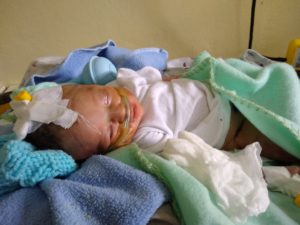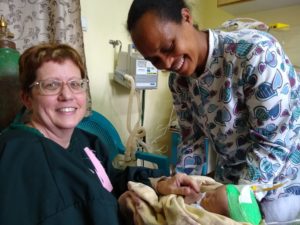 On a beautiful day in Soddo, as I was walking to the playground with my children, I ran into our missionary internist who told me of a young adult woman who had come to the hospital in respiratory failure due to Guillain-Barre Syndrome. Her respiratory muscles were too weak to take in enough air and she was suffocating. She was 34 weeks pregnant. The medical team had quickly placed her on a breathing machine and obtained permission from the family to do a Cesarean section to save the baby’s life. The baby was requiring a lot of support for breathing, but was stable and the mom was in recovery.
On a beautiful day in Soddo, as I was walking to the playground with my children, I ran into our missionary internist who told me of a young adult woman who had come to the hospital in respiratory failure due to Guillain-Barre Syndrome. Her respiratory muscles were too weak to take in enough air and she was suffocating. She was 34 weeks pregnant. The medical team had quickly placed her on a breathing machine and obtained permission from the family to do a Cesarean section to save the baby’s life. The baby was requiring a lot of support for breathing, but was stable and the mom was in recovery.
As a new mother of a nearly 3-month old baby, my heart quickened for this mother, her other children and her family. As the week went on, despite our best care, the mother died. Baby was slowly taking in formula each day, but after a few days, developed some blood in his stomach, likely from necrotizing enterocolitis. This is one of the feared complications of premature birth, and the risk rises when a baby receives formula instead of breast milk. The baby could not eat for a few days and started to get malnourished. There was no way for him to get breast milk from his mother, and the family had left to prepare for her burial. So who would pay for this child’s care? Unlike America, there is no medical insurance or Medicaid for orphans and widows. If a patient cannot pay for medical care in cash at the time of service, most places will turn the patient away. So this motherless child was left in our NICU without family and without much to eat for nearly 7 days. Thanks to some of our dedicated supporters, we had money in our benevolence fund to pay for this child’s hospitalization and we didn’t have to send him away.
As I sat at home and fed my own baby, I felt the grief of this child and his family and prayed for this baby. I felt that I needed to pump extra milk for this orphaned child, so I did.
Psalm 10:14 says, “But you, God, see the trouble of the afflicted. You consider their grief and take it in hand. The victims commit themselves to you; you are the helper of the fatherless.”
Our missionary community rallied around this child. I pumped for the baby, and we fed him through his nasogastric tube. As we started feeding him, he was comforted, cried less and tolerated his feeds. Our community of workers and NICU staff took turns holding baby throughout the day to give him attachment, love, prayers, and touch. The busy NICU staff commented that baby would be crying, but when someone came to hold him, he stopped.
We gave him everything we could: fluids, antibiotics, oxygen, a blood transfusion, physical touch, donated breast milk, and prayers. My heart was full of joy. He was flourishing, happy and felt a little like a part of our family. Then suddenly, he developed a fever and rash and died less than 18 hours later. I cried…a lot. As I walked home from the hospital, having just declared his death and completed the paperwork, God reminded me this boy was loved. He was placed into a family, our Soddo family. He was touched and held, and now he is with is mother. It was difficult to accept this as I walked home to my healthy 3 month old baby, but in this matter I have no choice.
It is a blessing to be a part of this hospital and this loving and caring team, even in difficult times. Yet now our benevolence fund is empty. We have to pay our staff a living wage and therefore cannot provide free care to everyone. So the dilemma exists: what do we do when faced with the poor, the widow, the orphan? Do we simply turn them away and not care for their medical needs? I am asking you to consider giving generously to our benevolence fund so we can be the light of Christ and the hands of God together as an international team that extends beyond the borders of our hospital grounds to those that come to our hospital’s door. Would you partner with us?
